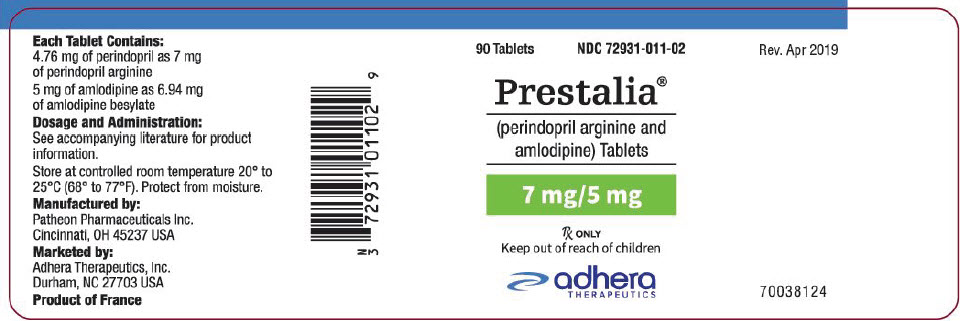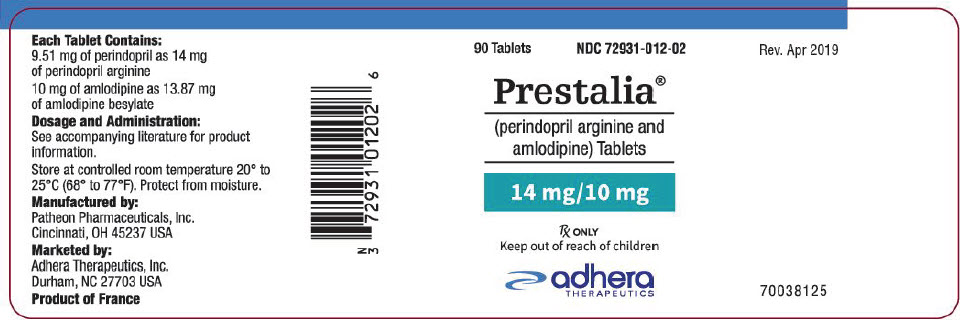Prestalia
Generic name: amlodipine and perindopril
Drug class: ACE inhibitors with calcium channel blocking agents
Medically reviewed by A Ras MD.
What is Prestalia?
Prestalia is a prescription medicine that contains perindopril arginine, an angiotensin converting enzyme inhibitor (ACE inhibitor), and amlodipine, a calcium channel blocker.
Prestalia is used to treat high blood pressure (hypertension) when one medicine to lower your high blood pressure is not enough or as the first medicine to lower your high blood pressure if your doctor decides you are likely to need more than one medicine
It is not known if Prestalia is safe and effective in children.
What is high blood pressure (hypertension)?
Blood pressure is the force in your blood vessels when your heart beats and when your heart rests. You have high blood pressure when the force is too great.
High blood pressure makes the heart work harder to pump blood through the body and causes damage to the blood vessels. Prestalia can help your blood vessels relax so your blood pressure is lower. Medicines that lower your blood pressure lower your chance of having a stroke or heart attack.
Description
PRESTALIA is a combination of perindopril arginine and amlodipine besylate.
Perindopril arginine is the L-arginine salt of perindopril, the ethyl ester of a non-sulfhydryl angiotensin converting enzyme inhibitor. Perindopril arginine is chemically described as L-arginine (2S,3aS,7aS)-1-[(2S)-2-[[(1S)-1-(ethoxycarbonyl)butyl]amino]propanoyl] octahydro-1H-indole-2-carboxylate. Its empirical formula is C19H32N2O5∙C6H14N4O2 and its structural formula is:

Perindopril arginine is a white, crystalline powder with a molecular weight 542.7. The free acid has the molecular weight of 368.5. It is readily soluble in purified water, slightly soluble in 95% ethanol, and practically insoluble in chloroform.
Perindopril is the free-acid form of perindopril arginine. Perindopril is a pro-drug and is metabolized in vivo by hydrolysis of the ester group to form perindoprilat, the biologically active metabolite.
Amlodipine besylate is the benzene sulphonic acid salt of amlodipine, a long-acting dihydropyridine calcium channel blocker. Amlodipine besylate is chemically described as 3-ethyl-5-methyl (±)-2-[(2-aminoethoxy)methyl]-4-(2-chlorophenyl)-1,4-dihydro-6-methyl-3,5-pyridinedicarboxylate monobenzenesulphonate. Its empirical formula is C20H25ClN2O5∙C6H6O3S and its structural formula is:

Amlodipine besylate is a white crystalline powder with a molecular weight of 567.1. It is slightly soluble in water and sparingly soluble in ethanol. The content of the tablets is expressed as amlodipine (free base) which has a molecular weight of 409.1.
PRESTALIA tablets are formulated in three different strengths for oral administration. Tablets contain perindopril arginine 3.5 mg, 7 mg, or 14 mg and amlodipine 2.5 mg, 5 mg, or 10 mg for the following available perindopril arginine/amlodipine combinations: 3.5/2.5 mg, 7/5 mg, and 14/10 mg.
Inactive ingredients are lactose, microcrystalline cellulose, colloidal silicon dioxide, and magnesium stearate.
What is the most important information I should know about Prestalia?
- Prestalia can cause harm or death to your unborn baby.
- Talk to your doctor about other ways to lower your blood pressure if you plan to become pregnant.
- If you become pregnant while taking Prestalia, tell your doctor right away. Your doctor may switch you to a different medicine to treat your high blood pressure.
Who should not take Prestalia?
Do not take Prestalia if you:
- have a history of angioedema. Symptoms of angioedema may include swelling of your face, tongue or throat, trouble breathing, itching, hives or skin rash, and stomach (abdominal) pain.
- are allergic to perindopril, or any other ACE inhibitor medicine
- are allergic to amlodipine
- have diabetes and take a medicine that contains aliskiren
What should I tell my healthcare provider before taking Prestalia?
Before you take Prestalia, tell your doctor about all of your medical conditions, including if you:
- have heart, liver or kidney problems
- have diabetes
- have been told that you have abnormal potassium levels in your blood
- are vomiting or have diarrhea
- plan to have a surgical procedure
- are pregnant or plan to become pregnant. See “What is the most important information I should know about Prestalia?”
- are breastfeeding or plan to breastfeed. It is not known if Prestalia passes into your breast milk. You and your doctor should decide if you will take Prestalia or breastfeed. You should not do both.
Tell your doctor about all the medicines you take, including prescription and over-the-counter medicines, vitamins, and herbal supplements. Taking Prestalia with other medicines can cause serious side effects.
Especially tell your doctor if you take:
- medicines for high blood pressure or heart problems
- water pills
- salt substitute
- potassium-containing medicines, potassium supplements, or salt substitutes containing potassium
Know the medicines you take. Keep a list of them to show your doctor and pharmacist when you get a new medicine.
How should I take Prestalia?
- Take Prestalia exactly as your doctor tells you.
- Take Prestalia 1 time each day, with or without food.
- If you miss a dose, take it as soon as you remember. If it is more than 12 hours, just take your next dose at the regular time.
- If you take too much Prestalia, call your doctor or go to the nearest emergency room right away.
What are the possible side effects of Prestalia?
Prestalia can cause serious side effects, including:
See “What is the most important information I should know about Prestalia?”
- Serious allergic reactions that can be life threatening. Stop taking Prestalia and get emergency medical help right away if you get any of these symptoms of a serious allergic reaction:
- swelling of your face, lips, tongue, throat, arms, hands, legs, or feet
- trouble swallowing
- trouble breathing
- stomach (abdomen) pain with or without nausea or vomitingPeople who are black and take Prestalia have a greater risk of having a serious allergic reaction than people who are not black and take Prestalia.
- Worsening of chest pain (angina) or a heart attack (myocardial infarction) can happen after you start taking or increase your dose of Prestalia. Get emergency help if you get worse chest pain or chest pain that does not go away.
- Low blood pressure (hypotension) is most likely to happen if you also:
- take water pills (diuretics)
- are on a low salt diet
- are on kidney dialysis
- have heart problems
- have vomiting or diarrhea
If you feel faint or dizzy, lie down and call your doctor right away.
- Increased amount of potassium in the blood. Your doctor will check your potassium blood level during your treatment with Prestalia.
- Cough.
- Kidney problems. Some people with certain conditions may develop kidney problems and may need to stop treatment with Prestalia. Call your doctor if you get swelling in your feet, ankles, or hands, or unexplained weight gain.
The most common side effects of Prestalia include:
- swelling of the feet, ankles, and hands
- cough
- headache
- dizziness
Tell your doctor if you have any side effect that bothers you or that does not go away.
These are not all the possible side effects of Prestalia. For more information, ask your doctor or pharmacist.
Call your doctor for medical advice about side effects. You may report side effects to FDA at 1-800-FDA-1088.
General information about the safe and effective use of Prestalia
Medicines are sometimes prescribed for purposes other than those listed in a Patient Information leaflet. Do not use Prestalia for a condition for which it was not prescribed. Do not give Prestalia to other people, even if they have the same symptoms that you have. It may harm them.
For more information, go to www.prestalia-us.net, contact: info@adherathera.com or call 1-888-359-0394.
How should I store Prestalia?
- Store Prestalia at room temperature between 68°F to 77°F (20°C to 25°C).
- Keep Prestalia in a tightly closed container and in a dry place.
Keep Prestalia and all medicines out of the reach of children.
What are the ingredients in Prestalia?
Active ingredients: perindopril arginine and amlodipine besylate
Inactive ingredients: lactose, microcrystalline cellulose, colloidal silicon dioxide, and magnesium stearate
Label
PRINCIPAL DISPLAY PANEL – 3.5 MG/2.5 MG TABLET BOTTLE LABEL
- 90 Tablets
NDC 72931-010-02 - Prestalia®
- (perindopril arginine and
amlodipine) Tablets - 3.5 mg/2.5 mg
- Rx ONLY
Keep out of reach of children - adhera
THERAPEUTICS

PRINCIPAL DISPLAY PANEL – 7 MG/5 MG TABLET BOTTLE LABEL
- 90 Tablets
NDC 72931-011-02 - Prestalia®
- (perindopril arginine and
amlodipine) Tablets - 7 mg/5 mg
- Rx ONLY
Keep out of reach of children - adhera
THERAPEUTICS

PRINCIPAL DISPLAY PANEL – 14 MG/10 MG TABLET BOTTLE LABEL
- 90 Tablets
NDC 72931-012-02 - Prestalia®
- (perindopril arginine and
amlodipine) Tablets - 14 mg/10 mg
- Rx ONLY
Keep out of reach of children - adhera
THERAPEUTICS

SRC: NLM .
